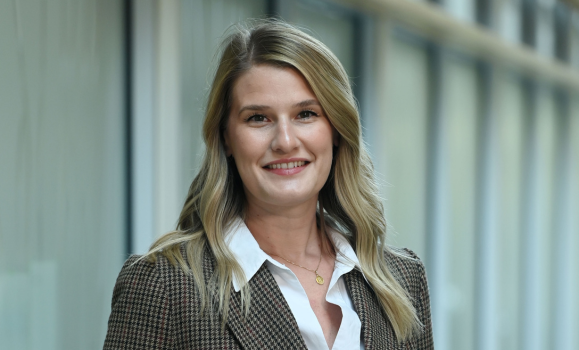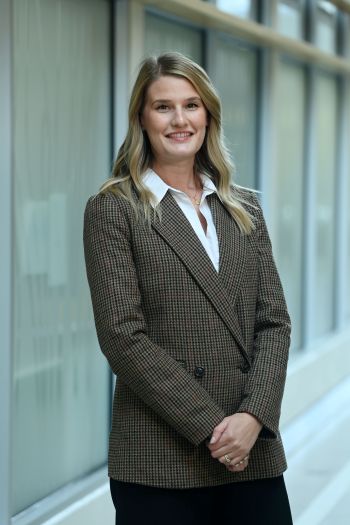Meet researcher, Dr. Lindsay Wallace

Dr. Lindsay Wallace is an assistant professor in the Department of Community Health & Epidemiology at Dalhousie University, where she also serves as the Dalhousie Site Co-Principal Investigator for the Canadian Longitudinal Study on Aging (CLSA). With a multidisciplinary background spanning psychology, neuroscience, and public health, Dr. Wallace is recognized for her innovative research at the intersection of aging, frailty, and dementia. Her work is driven by a commitment to understanding how biological, social, and policy factors shape health outcomes across the lifespan.
Dr. Wallace’s academic journey began with a fascination for brain and behavior, inspired by both coursework and personal experiences with family members affected by stroke and dementia. She completed her undergraduate studies in psychology and neuroscience, followed by graduate training at McGill University and Dalhousie, where her doctoral research demonstrated that frailty is a modifiable risk factor for dementia. This pivotal finding led her to broaden her focus from clinical research to population health, seeking ways to translate scientific evidence into meaningful, scalable change.
Her postdoctoral fellowship at the University of Cambridge, supported by a Banting Fellowship, deepened her expertise in global health systems and interdisciplinary collaboration. Dr. Wallace’s research now emphasizes prevention and risk reduction for chronic diseases, advocating for upstream interventions—such as improving access to nutrition, housing, education, and primary care—to promote healthy aging and reduce inequities. She is also passionate about professional development and science communication, mentoring students and early-career researchers to develop skills beyond the laboratory.
Dr. Wallace is known for her collaborative approach, working with colleagues across geriatrics, psychiatry, neuroscience, epidemiology, data science, and public health policy. Her leadership in large-scale cohort studies, such as the CLSA, ensures that research findings are both rigorous and relevant, informing public health practices and policy decisions in Canada and beyond.
Q: Can you describe your current research focus and how it builds on your doctoral work investigating frailty and dementia?
My research centers on preventing frailty and chronic disease by promoting healthy aging across the life course. I primarily study the intersection of aging, frailty, and dementia—building on my doctoral work, which showed that frailty is a modifiable risk factor for dementia. That led me to broaden my approach from clinical research to public health, exploring how we can translate what we learn into population-level change.
Q: What drew you to the intersection of epidemiology, public health, and neuroscience?
I’ve always been fascinated by how biological processes shape health and behavior. Studying the mechanisms behind frailty and dementia sparked questions I couldn’t answer in the lab alone—so I turned to epidemiology to see if those patterns held true in real-world settings, and to public health to figure out how to turn evidence into impact. Bridging these fields lets me follow questions from the cellular level all the way to policy impact.
Q: How did your experience at Cambridge Public Health shape your perspective on global health challenges?
My work at Cambridge taught me how interconnected health systems are—science, policy, and politics all shape one another. I learned that meaningful change takes persistence and collaboration, especially in areas like aging and dementia that evolve over decades. My supervisor there also modeled integrity and resilience, lessons I carry into my work every day.
Q: Your work emphasizes scalable solutions to reduce chronic disease. What are some promising interventions you've explored?
Public health and policy approaches are promising ways to equitably reduce the burden of chronic disease, including dementia. Since we don’t yet have a cure, prevention through risk reduction is key. Strategies that target upstream factors—like improving access to nutrition, housing, education, and primary care—help make healthy choices easier for everyone and reduce inequities over the life course.
Q: How do you use longitudinal cohort data and interdisciplinary collaboration to inform public health policy?
Longitudinal studies like the Canadian Longitudinal Study on Aging are essential for understanding how health and disease evolve over time. As co -Principal Investigator for the Dalhousie CLSA site, I focus on ensuring that high-quality data reflects people’s real experiences and can guide actionable policy. I collaborate with experts across disciplines to design research that’s both rigorous and relevant. Aging and dementia are too complex for any one field to tackle alone.
Q: What impact do you hope your work will have on public health policy and aging research?
I hope my work helps shift policy toward proactive, equitable approaches to aging—tackling the root causes of risk over the life course. Dementia risk is not equally distributed, and addressing the social determinants of health like education, income, and housing, to name a few, can have transformative effects. The goal is prevention that’s not just accessible, but equitable.
Q: How did mentorship shape your academic journey and research approach?
Mentorship has been foundational to my growth. I’ve been fortunate to work with inspiring leaders like Drs. Kenneth Rockwood, Olga Theou, Melissa Andrew, Sultan Darvesh, and Carol Brayne. Their passion and integrity helped me find my own voice as a researcher. They also gave me early opportunities to lead teams, write grants, and review manuscripts—experiences that built confidence and opened doors.
Q: How has professional development shaped your career, and what advice would you give to students?
Professional development has been critical to my career success. My mentors gave me opportunities and experiences early on that built confidence and opened doors. My advice to students is to learn the full scope of research beyond the thesis: communication, collaboration, and strategy matter just as much as scientific skill.

